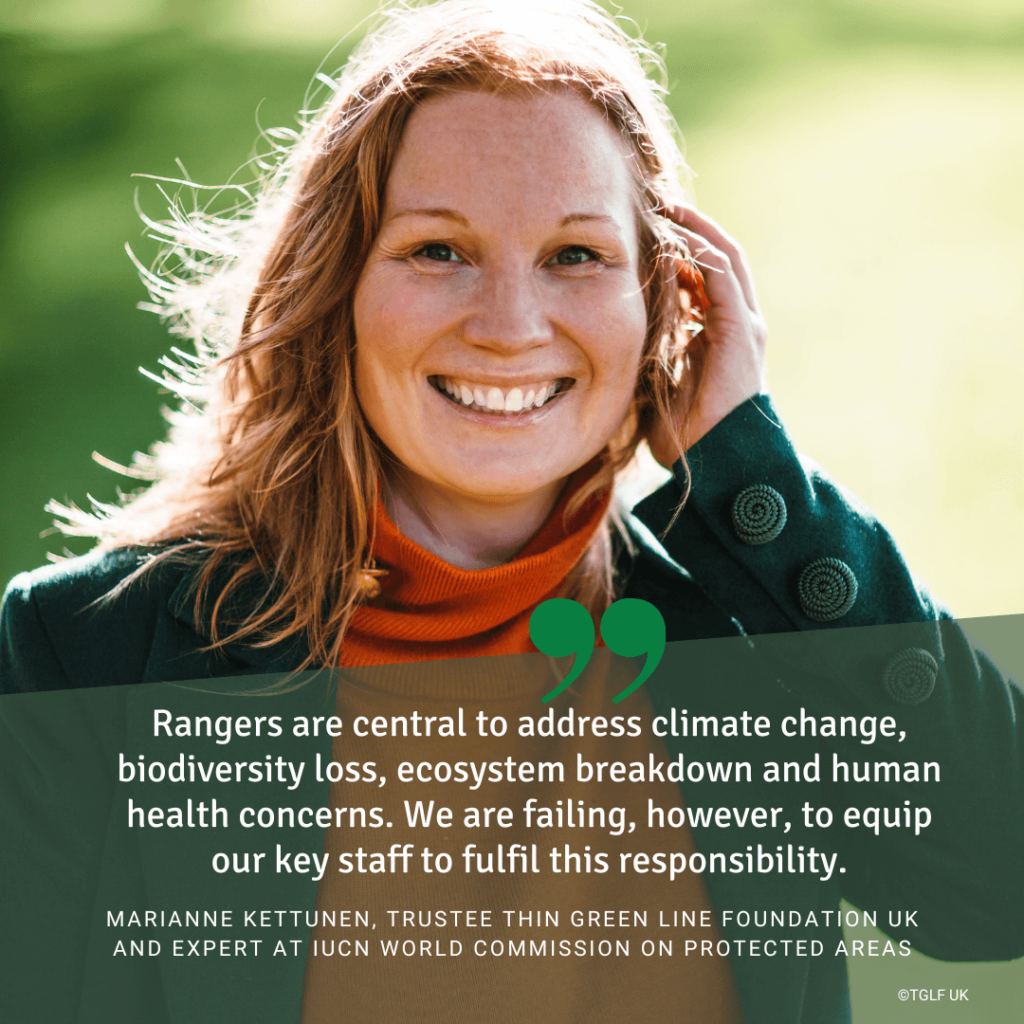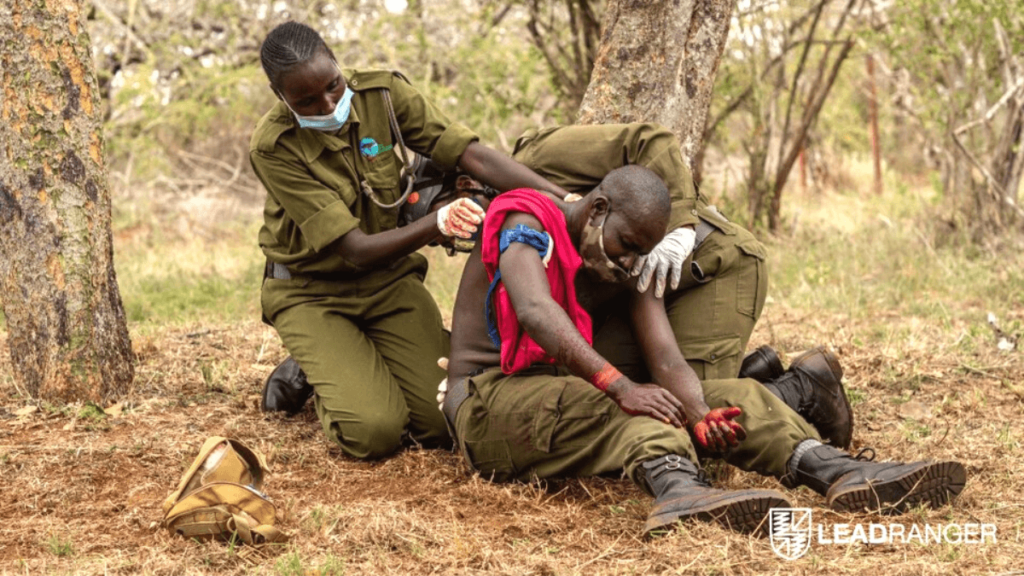Delivering global climate and biodiversity commitments requires investing in rangers as frontline workers for sustainability: This is what Marianne Kettunen, trustee of Thin Green Line Foundation UK (TGLF UK) and expert at the World Commission on Protected Areas (WCPA) of IUCN states. In this guest article, she not only describes the central role of rangers in achieving our global conservation goals. She also provides starting points on how their work can be better recognised and supported.
“Rangers play a central role in ensuring that protected and conserved areas provide benefits to both biodiversity and people, managing not only habitats and species but also the relationship between nature and local communities. As such, rangers are central to global, regional and national actions aimed at addressing climate change, biodiversity loss, ecosystem breakdown and human health concerns.

We are failing, however, to equip our key workers so that it matches the responsibility they carry. Rangers are commonly underpaid, poorly equipped and insufficiently trained, which affects their ability to carry out their job successfully and puts their own lives at risk. This is true especially in the global south and in high-risk areas for conservation. However, low wages, job insecurity and limited funds to operate are an issue around the world.
In 2021 at COP26 in Glasgow, followed by COP27 in Sharm el-Sheikh in 2022, the world leaders committed to halt and reverse forest loss and land degradation by 2030, to help to mitigate climate change and at the same time deliver inclusive, sustainable development. In December 2022 these leaders came together in Montreal to agree on the global goals for conserving biodiversity, with foreseen necessary increase in efforts to turn the tide by 2030.
“Delivering our climate and biodiversity commitments requires investing in rangers“
Marianne Kettunen, Trustee TGLF UK and Expert at World Commission on Protected Areas, IUCN
Rangers are the interface between the global policy objectives and the people on the ground in places where we want change to happen. This means that delivering our climate and biodiversity commitments requires investing in our frontline workers.
Studies show that investing in rangers makes economic sense. It is a job with one of the highest multiplier effects in the natural capital management sector, having a positive impact directly back into the local economy. In Kenya, for example, one ranger supports up to 24 members of the community on their salary. In general, an upcoming study led by TGL Australia demonstrates clear value creation by rangers to local communities, governments and private sector across case studies around the world.

The pandemic has had – and continues to have – a significant impact on rangers in the global south. Even though rangers as public sector workers have been asked to carry out covid response tasks, they have not been prioritised for personal protection equipment. As a result, a significant number of indigenous ranger elders have been lost to this disease, in South America in particular.
INTRODUCING THE THIN GREEN LINE FOUNDATION
The Thin Green Line Foundation UK supports rangers on the frontline, following the Thin Green Line Foundation in Australia. Read our interview with Director Abi Gatty Irving to learn about the aims, focus and importance of TGLF UK for Europe’s rangers. In the video, TGLF founder Sean Willmore also talks about the origins of the foundation and what motivated him to set it up.
READ INTERVIEW
How to improve the support framework for rangers?
Several actions need to be taken to improve the recognition that rangers play in supporting sustainability globally. These include, for example:
- Recognise the role of rangers: The multiple roles rangers play in supporting sustainable development needs to be better – and more explicitly – recognised in the future policy frameworks, internationally and nationally. Attention paid to improving rangers’ working conditions in the context of existing international frameworks is next to none. Therefore, it would be important to improve the level of recognition when moving forward with the 2030 Global Biodiversity Framework adopted in December 2022, including integrating support to rangers in the updated national biodiversity strategies and action plans.
- Treat rangers as respected partners: Rangers need to be included as key stakeholders taking part in the governance of sustainable development, including providing advice to policy and decision-making at international and national level. For example, ranger representation should be systematically part of the implementation of national and regional biodiversity strategies, and also the design and evaluation of assistance to countries in the developing world.
- Feed ranger needs, insights and lessons learned into policy: There is a need for both increasing ranger numbers and developing ranger capabilities. Better policy frameworks are needed to improve salary levels, job security, and access to health care and insurance. Support is also required to enable rangers to improve their capability to cooperate with local communities.
- More and better cooperation between actors: There are several actors working successfully with rangers on the ground. These need to be better and more systematically linked with actors working in the policy space.
- Establish mechanism for stable, long-term funding: Where support to governments is needed, external funders and donors should aim for longer term funding to attract and retain rangers. The administrative burden should be kept in check, to ensure rangers have access to the support in a timely manner. Innovative funding mechanisms, such as integrating rangers into carbon offsetting schemes, could also be explored.”
Marianne Kettunen, marianne@thingreenline.org.uk
This article builds on the Thin Green Line Foundation Strategy 2022 – 2025 and a guidance by IEEP, IUCN WCPA, UNDP, the World Bank, TNC, WCS and WWF on “Building on nature: Area-based conservation as a key tool for delivering SDGs” (2021), including a related event co-hosted by Thin Green Line Foundation UK (2021).

